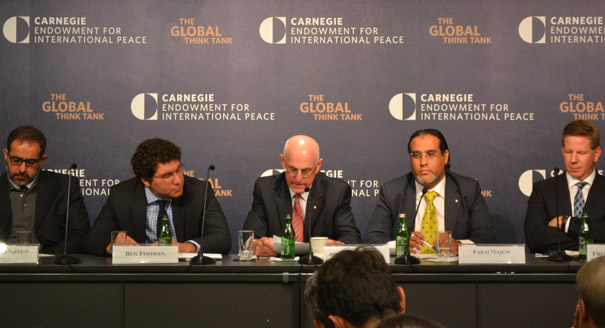Registration
You will receive an email confirming your registration.
The brief but shocking abduction of Prime Minister Ali Zeidan refocused the world’s attention on the politicization of Libya’s armed groups. Many are in theory subordinate to the government but continue to act autonomously, with firepower and numbers that vastly exceed that of the regular army and police. Despite numerous initiatives, the Libyan government has been unable to disarm and demobilize the armed groups, or integrate their members into the formal security apparatus. Although the United States and several NATO members have recently announced plans to train and equip a new Libyan army, the country faces enormous challenges in rebuilding and reforming its security sector.
A panel of senior policymakers and scholars offered firsthand reflections and insights into efforts by the Libyan government, the United States, and the international community to restore security in Libya.
This event was off the record.
Aref Ali Nayed
Aref Ali Nayed is the ambassador of Libya to the United Arab Emirates. He is also founder and director of Kalam Research & Media (KRM). Until the outbreak of the revolution in Libya, he lectured on Islamic theology, philosophy, and logic at the restored Uthman Pasha Madrassa in Tripoli, and supervised graduate students at the Islamic Call College there. During the revolution, prior to the liberation of Tripoli in 2011, he was appointed by the National Transitional Council as the coordinator of the Tripoli Taskforce.
Ben Fishman
Ben Fishman was director for North Africa and Jordan on the National Security Staff until September 2013. He was the principal action officer at the White House responsible for Libya starting in April 2011 and helped coordinate U.S. policy toward the intervention in Libya and the political transition. He previously worked at the NSS and Department of State on Israeli-Palestinian issues and Iran and was a research associate at the Washington Institute for Near East Policy. He is a consulting senior fellow at the International Institute for Strategic Studies.
Faraj Najem
Faraj Najem is the director of Salam Centre for African Research in Tripoli. He is a professor of public administration at Benghazi University and a specialist on Libyan political and tribal dynamics. He is a founder of the Forum for Democratic Libya, and served in the Commission for Advice & Support to National Transitional Council of Libya.
Michael G. Smith
Michael G. Smith is a visiting fellow at the Asia-Pacific College of Diplomacy at the Australian National University, and an adjunct professor at the Key Centre for Ethics, Governance, and Law at Griffith University in Australia. He was director of the Security Sector Advisory & Coordination Division of the United Nations Support Mission in Libya. He and his team were responsible for assisting and advising the Libyan authorities on security sector governance and reform, in coordination with the UN country team and key international actors.
Frederic Wehrey
Frederic Wehrey is a senior associate in the Carnegie Middle East Program focusing on North Africa and the Persian Gulf. He is the co- author of Building Libya’s Security Sector.
